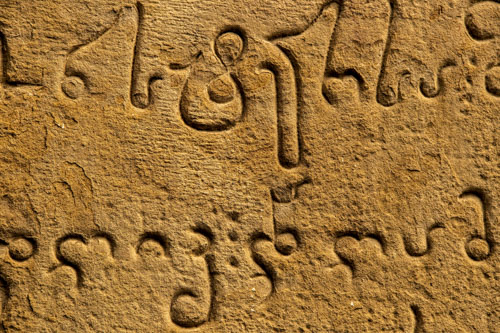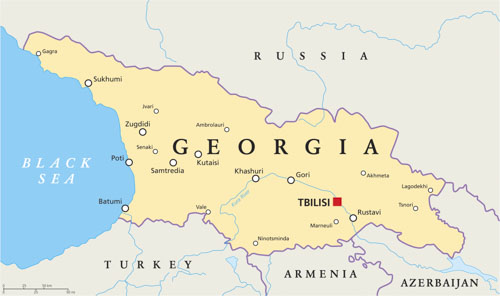Written by Rebecca Schmor
In the above photo: Tbilisi, Georgia
CASLT’s Discovering Languages series aims to spark interest in plurilingualism and pluriculturalism among language learners, school communities, and the public. Each featured language is explored in a blog article and accompanied by a classroom-ready activity for language teachers. Use these activities to promote and popularize language learning among your students and help them develop intercultural competencies.
The Georgian language — the official language of the country of Georgia — has a unique linguistic history spanning Eastern Europe and Western Asia, the Black Sea and the Caucasus mountains. Read on to discover 10 things you (maybe) didn’t know about the Georgian language.
1. Georgian is a Kartvelian language
Georgian is the most widely spoken language in the Kartvelian language family (also known as South Caucasian or Iberian languages). Other languages in this family include Svan, Zan, and Laz. Kartvelian languages are spoken primarily in Georgia, as well as by Indigenous communities in Azerbaijan and Turkey, and in diasporic communities in Russia, Iran, Europe, North America, and Israel. The Kartvelian language family is not related to other language families, which makes it one of the world’s primary language families.
2. The Georgian alphabet has three writing systems
The three writing systems used in the Georgian language are known as the Georgian scripts: Asomtavruli, Nuskhuri, and Mkhedruli. They are all written from left to right, and their letters have the same names and alphabetical order but different appearances. The standard script for modern Georgian is Mkhedruli, while Asomtavruli and Nuskhuri are used by the Georgian Orthodox Church for religious texts and ceremonies. The UNESCO Representative List of the Intangible Cultural Heritage of Humanity includes the “Living culture of three writing systems of the Georgian alphabet.”

3. Georgian script originated in the 5th century AD
Written in Asomtavruli script, the Old Georgian Bir el Qutt inscriptions are recognized as the earliest literary source in any Kartvelian language. They were found near Bethlehem at the site of an ancient Georgian monastery dating back to around 430 AD.
4. The Georgian language has at least 18 dialects
With more than 18 mutually intelligible dialects spoken in five regions of Georgia, modern standard Georgian is based on the central Kartilan dialect. The historical region of Kartli was once known as Iberia and is now home to Georgia’s capital, Tbilisi. Outside of Georgia, two eastern dialects are spoken in Azerbaijan (Ingiloan dialect) and Iran (Fereydanian dialect). There is also a language variety spoken by Georgian Jews called Judæo-Georgian.

5. Georgian has words that begin with seven consonants
Georgian has many words that begin with combined consonant sounds, such as the word “water,” which starts with two consonants: წყალი (ts’q’ali). More extreme examples include the word “trainer” — მწვრთნელი (mts’vrtneli) — which starts with six consonants, or the word “you train us” — გვწვრთნი (gvts’vrtni) — which has seven initial consonant sounds.
6. Georgian doesn’t use pronouns
Georgian is a pro-drop (pronoun-dropping) language, like Spanish, Greek, or Hindi, meaning that subject pronouns (like “I” or “she”) are regularly omitted. Pronouns are only used for emphasis or when there is ambiguity.
7. Georgian has seven cases
Like Ukrainian, German, and Latin, Georgian has multiple noun cases, including nominative, ergative, dative, genitive, instrumental, adverbial, and vocative. For example, in the Georgian phrase Sakartvelos resp’ublik’a (the republic of Georgia), the word “Georgia” is in the genitive case. Comparatively, English currently uses three cases: nominative (e.g., “I”), accusative (e.g., “me”), and genitive (e.g., “my”).
8. Georgian has no articles
Just like Chinese, Japanese, Estonian, and Finnish, the Georgian language does not use definite or indefinite articles (like “the” or “a” in English). Instead, the information usually expressed by articles can be conveyed through word order. Georgian has a flexible word order, using subject-object-verb, subject-verb-object, and sometimes object-subject-verb order.
9. Georgian has three ways to negate
When using negation in Georgian, speakers must decide between “ar” (not), “ver” (cannot), and “nu” (do not!). While “ar” is used most commonly (e.g., Tsasvla ar minda; I do not want to go), “ver” indicates an inability to carry out an action (e.g., Ver movedi; I could not come), and “nu” is only used when giving negative commands (e.g., Nu nerviulob!; Don’t worry!).
10. Georgian has two sets of month names
Based on the ancient Georgian calendar that reflected the traditional agricultural seasons, the old months of the year include names such as აპნისი (Ap’nisi) or “Month of Waters” for January, თიბათვე (Tibatve) “Month of Mowing” for June, and მკათათვე (Mk’atatve) “Month of Reaping” for July. In the ancient calendar, the new year started in September. Modern month names mimic the Gregorian calendar, such as დეკემბერი (Dek’emberi) for December.
As you can see, the Georgian language is linguistically and culturally rich. Which fact about Georgian do you find the most interesting?
Comparing Language Systems: Georgian, English, and Other Languages
Activity Description
This activity is designed with university-level English language learners in mind, but can be adapted for use in other contexts and with other target languages. The activity promotes plurilingual language learning by inviting learners to analyze and compare features of the Georgian language with the target language (in this case, English) as well as other languages. Through this activity, learners can bring their knowledge of other languages into the classroom, expand their awareness of different language systems, and reflect on their interactions with diverse speakers and language learners.
Activity Steps
1. Introducing the Georgian Language (15 minutes)
Show samples of text or audio in the Georgian language and invite learners to identify the language and share what they know (or don’t know) about it. Discuss the importance of learning about other (especially underrepresented or historically excluded) languages and how cross-linguistic comparison can help improve language learning abilities.
2. Comparing Language Systems (35 minutes)
In small groups, invite learners to analyze the chart below and share responses to the questions by drawing on the other languages they know or conducting some research on other language systems. As a class, discuss the examples given or refer to the answer key that follows.
| Georgian Language | Other Languages | English Language |
| Georgian belongs to a language family of Kartvelian languages which include Svan, Zan, and Laz. | What other languages belong to a language family? | Does English belong to a language family? |
| The Georgian alphabet has three writing systems. | What other languages use multiple writing systems as part of their alphabet? | Does English use multiple writing systems? |
| The Georgian language has 18 mutually intelligible dialects. | What other languages have dialectal varieties? | Does English have dialectal varieties? |
| Georgian has seven noun cases (nominative, ergative, dative, genitive, instrumental, adverbial, and vocative). | What other languages have cases? | Does English have cases? |
| Georgian is a pro-drop (pronoun-dropping) language. | What other languages regularly drop pronouns? | Does English ever drop pronouns? |
| Georgian has no articles. | What other languages use no articles? | Does English use articles? |
| Georgian has a flexible word order, using subject-object-verb, subject-verb-object, and sometimes object-subject-verb order. | What other languages have a flexible word order? | Does English have a flexible word order? |
| Georgian has a vigesimal numeric system (e.g., “93” literally translates as “four times twenty plus thirteen”). | What other languages have a vigesimal numeric system? | Does English have a vigesimal numeric system? |
| Georgian is an agglutinative language (new words are built by joining together certain prefixes and suffixes). | What other languages are agglutinative? | Is English agglutinative? |
| Most Georgian surnames have endings like –dze (“son”), or –shvili (“child”). | What other languages use this surname practice? | Does English use this surname practice? |
3. Analyzing Student Writing (25 minutes)
Extract a series of language errors found in student writing and invite learners to work together to correct these sentences, prompting them to consider some of the features of different language systems discussed in the activity in step 2. For example, in a sentence like “This is reason why,” learners could identify an error in article use, and discuss how articles are used in English and in other languages.
4. Reflecting on Intercultural Communication (15 minutes)
Framing communicative understanding as a shared responsibility, invite learners to discuss the following questions:
- What features of other language systems have you heard/might you hear being used in English?
- How can you use your knowledge of different language systems to help you better understand other learners of English?
Activity Answer Key
| Questions | Answers |
| What other languages belong to a language family? | e.g., Portuguese — romance language |
| Does English belong to a language family? | Yes — West Germanic |
| What other languages use multiple writing systems as part of their alphabet? | e.g., Japanese — hiragana, katakana, and kanji |
| Does English use multiple writing systems? | No — only the Latin alphabet |
| What other languages have dialectal varieties? | Many — e.g., Spanish (Mexican, Cuban, Chilean, etc.), Arabic (Egyptian, Moroccan, Gulf, etc.) |
| Does English have dialectal varieties? | Yes — Canadian, Nigerian, New Zealand, etc. |
| What other languages have cases? | Ukrainian, German, Latin, etc. |
| Does English have cases? | Yes — three (nominative/I; accusative/me; genitive/my) |
| What other languages regularly drop pronouns? | Spanish, Greek, Hindi, etc. |
| Does English ever drop pronouns? | No |
| What other languages use no articles? | Chinese, Japanese, Estonian, etc. |
| Does English use articles? | Yes — definite and indefinite |
| What other languages have a flexible word order? | e.g., Spanish, Korean |
| Does English have a flexible word order? | No — fixed word order |
| What other languages have a vigesimal numeric system? | French, Basque, Welsh, Gaelic |
| Does English have a vigesimal numeric system? | No |
| What other languages are agglutinative? | Many — Quechua, Cree, Tagalog, Korean, Turkish, Hungarian, Finnish |
| Is English agglutinative? | No (with some exceptions, e.g., “antidisestablishmentarianism”) |
| What other languages use this surname practice? | French (de), German (von), Polish (ski) |
| Does English use this surname practice? | Yes — with suffixes -son/-s/-kin/-kins/-ken, e.g., “Johnson”, “Adams”, or “Jenkins” |
Adapting the Activity
This activity can be adapted by changing the target language(s), removing or adding steps (e.g., doing some online research), or modifying which features to analyze in comparing language systems.
References
Hewitt, G. (2005). Georgian: A learner’s grammar. Routledge. https://www.routledge.com/Georgian-A-Learners-Grammar/Hewitt/p/book/9780415333719
Lobzhanidze, I. (2022). The Georgian language. In Finite-state computational morphology (pp. 3–115). Springer. https://doi.org/10.1007/978-3-030-90248-3_2
Shosted, R. K., & Chikovani, V. (2006). Standard Georgian. Journal of the International Phonetic Association, 36(2), 255–264. http://www.jstor.org/stable/44526423




